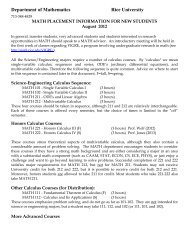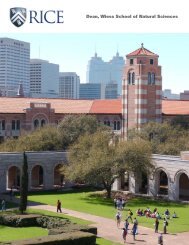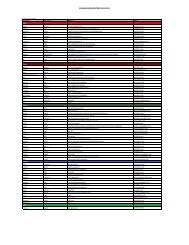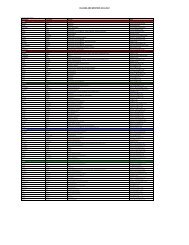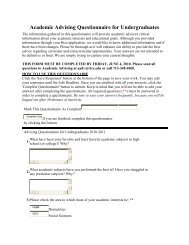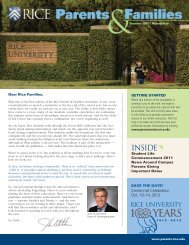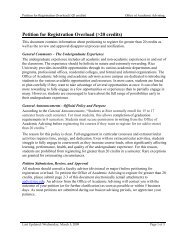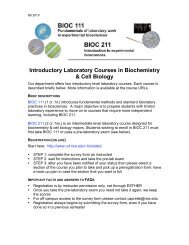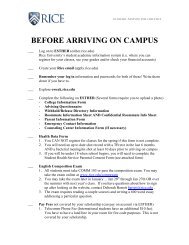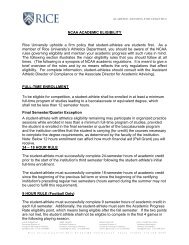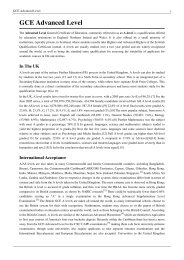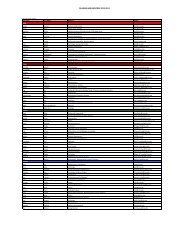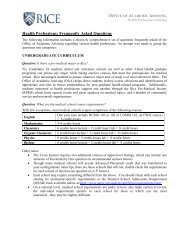Biochemistry & Cell Biology Advising Packet Fall ... - Rice University
Biochemistry & Cell Biology Advising Packet Fall ... - Rice University
Biochemistry & Cell Biology Advising Packet Fall ... - Rice University
You also want an ePaper? Increase the reach of your titles
YUMPU automatically turns print PDFs into web optimized ePapers that Google loves.
Finding and Securing Research Opportunities<br />
Think about the sorts of research that may be of interest to you and talk to students and advisors in that<br />
area of research. Explore on your own by searching through different research departments at <strong>Rice</strong> or in the<br />
Texas Medical Center. You can learn about the research in a particular department by going to the “Faculty”<br />
or “People” tab and clicking through the various faculty names and research statements. At the same time,<br />
join the BCB Opportunities Owl-Space site to receive information about research opportunities at <strong>Rice</strong> and<br />
elsewhere. (Log on to Owl-Space and select the following: “My Workspace”-> “Membership” -> “Joinable<br />
Sites” and select BCB Opportunities). When you have found a lab(s) of interest, scan through recent<br />
research articles from that lab and contact the professor to express your interest. (Before contacting the<br />
professor, it may be helpful to read the Bioc 310 course manual to get a feel for the expectations of an<br />
undergraduate researcher. www.bioc.rice.edu/bioc310/). Determine the nature of your internship<br />
(volunteer, for pay, for credit, for one semester/summer, for multiple years). If you are interested in receiving<br />
credit for your research, contact the instructor of the research-for-credit/independent study course in the<br />
appropriate department. Links to the BCB department and to various off-campus departments may be found<br />
on the off-campus portion of the Bioc 310 website.<br />
Independent research in the Department of <strong>Biochemistry</strong> and <strong>Cell</strong> <strong>Biology</strong> and beyond.<br />
Once you have found a research position, you may be eligible to receive course credit in an appropriate<br />
department. All of the following courses may be taken by permission only. Please contact the course<br />
instructors for additional details and requirements.<br />
BIOC 310—<strong>Biochemistry</strong> and <strong>Cell</strong> <strong>Biology</strong><br />
EBIO 306—Ecology and Evolutionary <strong>Biology</strong><br />
BIOE 400/401—Bioengineering<br />
CHBE 500—Chemical and Biomolecular Engineering<br />
NEUR 485—Neuroscience<br />
CHEM 491—Chemistry<br />
KINE/HEAL 495/496 —Kinesiology/Health Sciences<br />
HONS 470/471 (RUSP) —Office of Fellowships and Undergrad. Research, for all majors<br />
UNIV 301—<strong>University</strong>-wide, zero-credit, for all majors, all types of projects qualify<br />
Find the course number/department that best matches your research interests. Most departments, including<br />
those not listed here, have an independent study/research course.<br />
Note for those interested in the health professions: There are many types of research that can improve<br />
human health outside of the biological sciences (health disparities economics, medical sociology, psychology<br />
of addiction, etc.). For the most fulfilling research experience, make sure to pursue the research that most<br />
interests you rather than that which you perceive is desired by med schools.<br />
<strong>Biochemistry</strong> and <strong>Cell</strong> <strong>Biology</strong> undergraduate research contact information:<br />
Dereth Phillips, Ph.D., instructor: Bioc 115 and Bioc 310, master: McMurtry College<br />
office: 340 Anderson Biological Labs, email: derethp@rice.edu<br />
11



